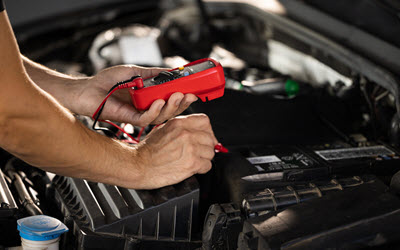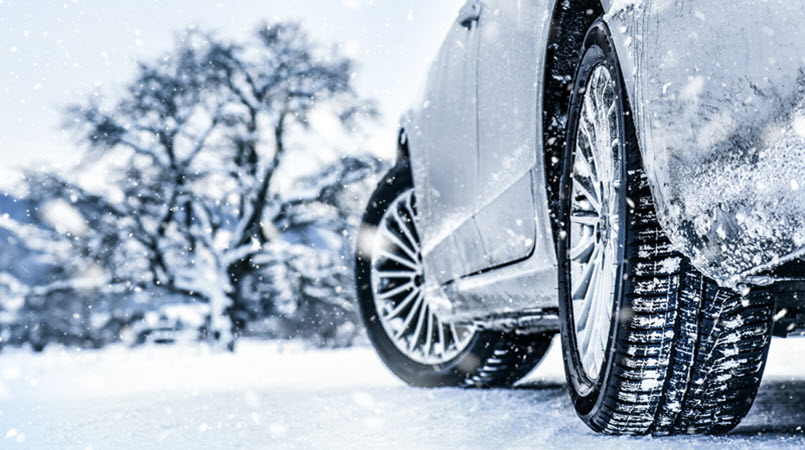For the residents of Green Bay, the shift from frigid, snowy winters to warm, humid summers presents a unique set of challenges for vehicle owners. Each season brings its own brand of wear and tear from the corrosive road salt and battery-draining cold of winter to the tire-stressing heat of summer.
Understanding these extreme temperature swings, moisture, and road conditions affects the car’s critical components such as tires, fluids, and battery, which are essential for proactive maintenance and ensure the vehicle runs smoothly and safely all year long.
Winter: The Ultimate Test of Automotive Endurance
- The Battery Battle: Below-freezing temperatures slow the chemical reactions inside the battery car, reducing its cranking power when needed most. The average three-year-old battery can lose half of its strength in extreme cold, which can lead to a dead vehicle on a frigid morning.
- Thickened Fluids: Engine oil and transmission fluid thicken in cold weather, which can cause the engine to work harder and turn over more slowly. This can increase the friction and wear on vital internal components during cold starts. For this reason, the manufacturer recommends winter-grade oil with a lower viscosity.
- Tire Pressure Instability: A 1-PSI drop in tire pressure occurs for every 10-degree Fahrenheit decrease in temperature. This can cause under-inflation, which decreases traction, impairs handling, and accelerates tire wear —a hazardous situation on icy roads. For maximum safety, many Green Bay drivers switch to dedicated winter tires, which are made from a softer rubber compound that remains flexible in cold temperatures.
Spring: The Aftermath of Winter’s Fury
- Pothole Pandemonium: The freeze-thaw cycle of winter is brutal on roadways, and spring is pothole season in Green Bay. Hitting these craters can cause damage to tires, wheels, and suspension components, resulting in alignment issues and other costly repairs.
- Corrosion Inspection: Spring is an ideal time for a vehicle inspection to check for any corrosion and damage that may have occurred during the winter months. A thorough undercarriage wash is necessary to remove any lingering salt and debris before they cause further damage.
- Check for Fluid Leaks: The fluctuating temperatures of spring can cause hoses and seals to crack, leading to fluid leaks. A quick check for any puddles or drips under the vehicle can prevent a more serious problem.
Summer: Dealing with Heat and Humidity
- Overheating Danger: The heat forces a vehicle’s cooling system to work overtime to prevent overheating. Low coolant levels, a malfunctioning radiator, and a faulty water pump can cause the engine to overheat, resulting in severe and expensive engine damage.
- AC and Climate Control: Air conditioning is essential during the summer season. A failing AC can be an uncomfortable inconvenience and also a sign of a larger issue with the cooling system.
- The Battery’s Other Enemy: Cold weather is harsh on batteries, and extreme heat can be equally damaging by causing the battery fluid to evaporate. This can shorten the battery lifespan and cause it to fail unexpectedly.
Seasonal Vehicle Maintenance: Your Guide for Green Bay’s Changing Weather
- Battery Care is needed as cold weather can reduce the battery’s cranking power. Before winter, it is necessary to have your battery load tested by a mechanic to check its health. Keeping the terminal clean from corrosion and considering replacing it if it’s old.
- Switching to winter tires is also necessary, as all-season tires can stiffen in temperatures below 45°F, which can lead to a loss of traction. Winter tires are composed of a softer rubber compound and a deeper tread that can remain flexible and provide grip on snow and ice.
- Underbody rust protection is needed as road salt is highly corrosive in nature, causing damage to the vehicle’s undercarriage. Applying a protective undercoating before winter can act as a vital barrier against corrosion.
- Checking the fluids, belts, and hoses as winter temperatures fluctuate can cause the seals and hoses to become brittle and crack. Inspect the engine belts and hoses for any damage, and check and top off the fluid levels, including oil, brake fluid, transmission fluid, and coolant.
- Check the cooling system before the heat sets in with the help of a mechanic by inspecting components such as the radiator, thermostat, and water pump, and ensuring the coolant level is in good condition to prevent
Trust Your Ride to a Local Expert: Seasonal Car Care in Green Bay
For Vehicle owners in Green Bay, the  changing seasons are not just a part of life, but they are also a direct factor in the health and longevity of the vehicle. The solutions to these seasonal challenges require proactive care and expertise. At Huron Automotive, with locations in Green Bay, we understand the unique demands placed on vehicles by Green Bay’s climate. We are equipped with advanced tools and have certified technicians to handle everything from winterizing your vehicle and installing winter tires to checking your cooling system and addressing any rust or corrosion caused by road salt.
changing seasons are not just a part of life, but they are also a direct factor in the health and longevity of the vehicle. The solutions to these seasonal challenges require proactive care and expertise. At Huron Automotive, with locations in Green Bay, we understand the unique demands placed on vehicles by Green Bay’s climate. We are equipped with advanced tools and have certified technicians to handle everything from winterizing your vehicle and installing winter tires to checking your cooling system and addressing any rust or corrosion caused by road salt.
